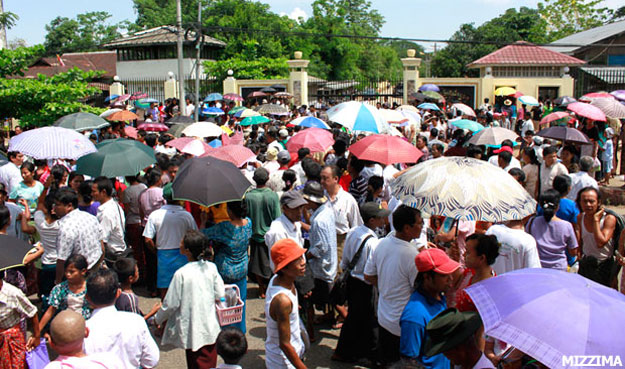(Feature) – Su Su Kyi is one of the thousands of relatives of political prisoners who must travel long distances across Burma to see their family members. With five relatives who are political prisoners, it is an emotionally draining and financially costly experience.
She has been doing it for many years. She’s been forced to sell her apartment to cover bills, and it’s a constant burden to find people who can care for her own children when she’s on the road.

It’s a painful litany: her daughter, Thet Thet Aung, is serving a 65-year prison term in Myinchan Prison; her son-in-law, Chit Ko Lin, is serving a seven-year prison term in Pakokku Prison; her sister, San San Tin, 63, is serving a five-year prison term in Meiktila Prison; her niece, Noe Noe aka Nwe Hnin Yi, is serving a seven-year prison term in Maubin Prison; her nephew, Kyaw Swar Htay, is serving a 14-year prison term in Bhamo Prison.
“In the future, we will not hope,” Su Su Kyi said. “But when they are released, I will not forbid them to participate in political activities because they are doing it for the country and the people. They were imprisoned for their beliefs. As for me, I’ll visit the prisons as long as they are there. I’ll do it till I die,” she said.
Su Su Kyi, 56, has had to brave erratic bus service and poor road conditions. Sometimes her sisters can care for her oldest children, and she takes the youngest with her.
“I need to take about 10 days per visit to a prison. The child has to travel with me and he becomes travel-worn and gets sick,” she said.
“In 2007, my daughter and my son-in-law were arrested a few days after the 88-generation students launched the protest in Rangoon,” she said, and she began caring for her grandchildren.
“When they arrested my daughter and son-in-law, the youngest grandchild had not been weaned,” she said. “He’s received blood transfusions since he was an infant. Other relatives couldn’t look after him. Many foods are not good for him so I took him with me everywhere.”
Su Su Kyi said that sometimes she was not allowed to meet with her relatives, adding more emotional stress.
In one occasion, she said that although other visitors were allowed to meet with their relatives in Meiktila Prison for one hour; she was allowed just 30 minutes. So, she refused to obey the order and talked for one hour as a protest. As a consequence, her sister San San Tin was sent from the "political prisoner" ward to the "criminal" ward, she said. She said her sister lost the sight in her left eye because she did not receive medical treatment in prison.
She said because her relatives are scattered in prisons across the country, it creates a terrible burden. “They are detained in different prisons and that’s a torture for us,” she said.
Recently, she met with more than 20 family members of political prisoners in her home on in Sanchaung Township in Rangoon to exchange ideas on ways to support families of political prisoners.
Among the parents who attended were the mother of student leader D Nyein Lin (Khamtee Prison); the mother of Si Thu Maung (Buthidaung Prison); the mother of 88-generation student Zaw Htet Ko Ko (Kyaukphyu Prison); the wife of activist Htin Kyaw (Khamtee Prison); the sister of 88-generation student Than Tin (Sittwe Prison); and the father of All Burma Federation of Student Unions member Honey Oo (Lashio Prison). Recently-released political prisoners Zeyar Thaw also attended the meeting, she said.
They established a fund for political prisoners who need medical care.
There are about 2,000 political prisoners in Burma. Despite people’s hope for a general amnesty, only 50 political prisoners along with 14,600 other prisoners were released under the one-year commutation ordered by new President Thein Sein earlier this year.



